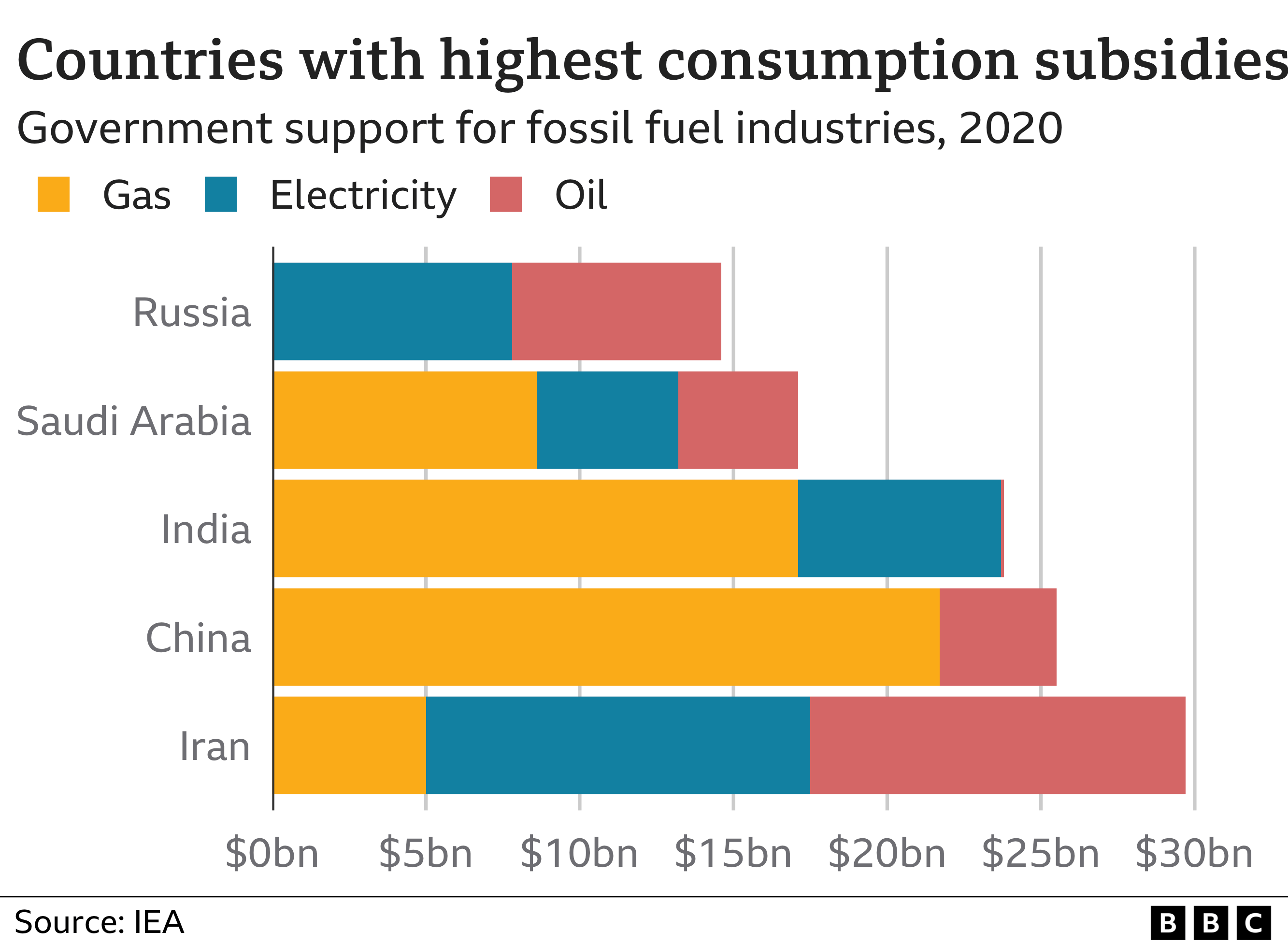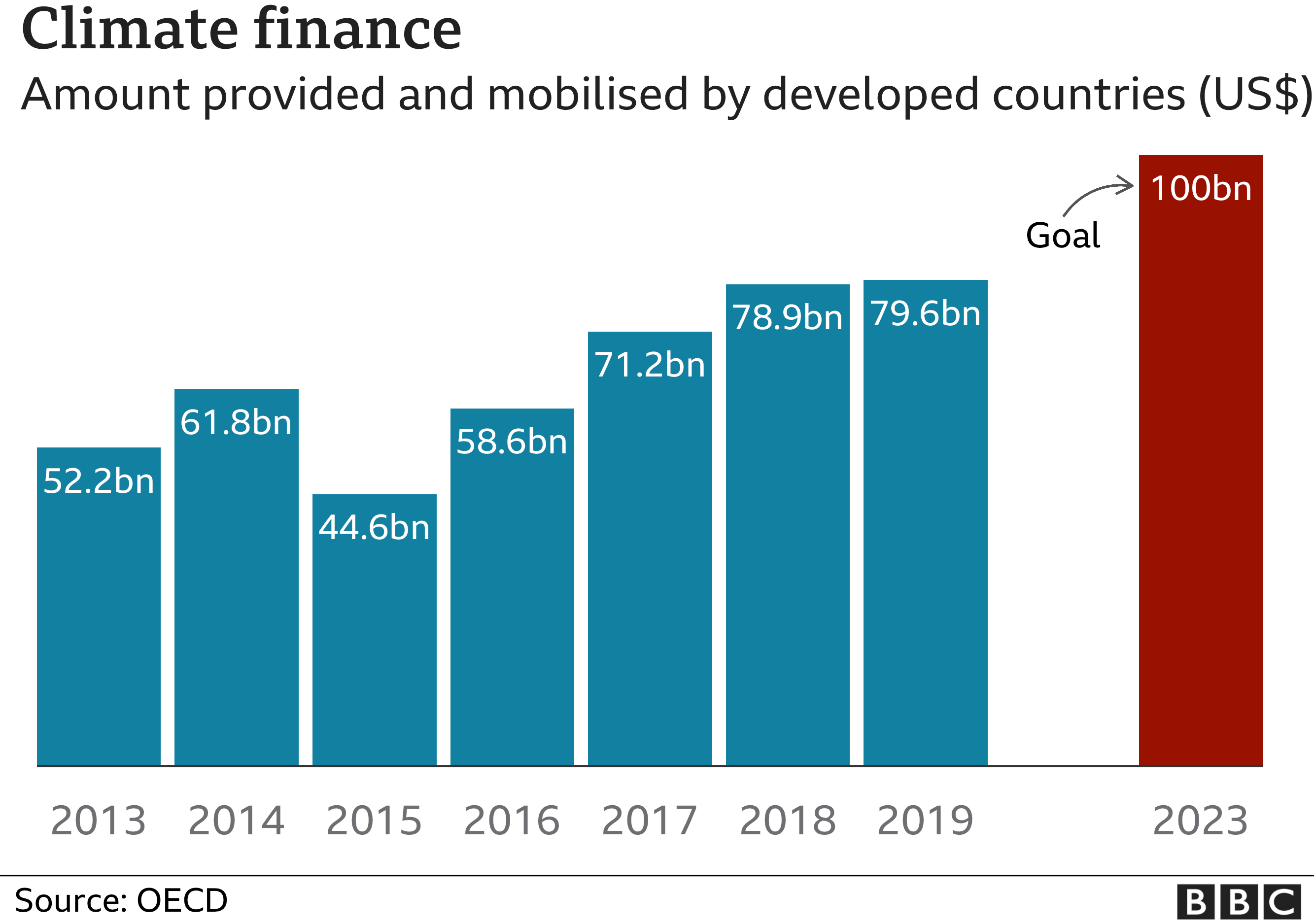
New targets for reducing emissions, cutting back on fossil fuels and ending deforestation were agreed by world leaders at the COP26 summit. Nations are meeting again in Bonn to discuss progress since the Glasgow Climate Pact was signed at COP26. So, are they keeping their promises?
Emissions: Possible fall this year
What was agreed?
In Glasgow, countries agreed to submit more ambitious climate plans, including cuts to emissions of carbon dioxide (CO2).
Why does it matter?
Carbon dioxide is a greenhouse gas which causes climate change. Reducing emissions is needed to help keep temperature rises within 1.5C. Above this could cause “climate catastrophe”, according to UN scientists.
What’s been done?
Countries were given a deadline of September to submit new plans – but currently only 11 countries out of 196 have done so.
However, recent analysis suggests that China has seen a continuous reduction in emissions since summer 2021. This could have a significant impact as it is responsible for 27% of the world’s emissions.
What is COP and the Bonn Climate Change Conference?
Every year the world’s governments meet at a climate summit called Conference of the Parties (COP). The 26th of these – COP26 – was in Glasgow last year; COP27 is in Sharm-el-Sheikh, Egypt, later this year. The Bonn Climate Change Conference is halfway between the two COPs – to check progress
What was agreed at COP26?
Fossil fuels: Energy crisis threatens progress
What was agreed?
COP26 included a plan to reduce use of coal – which is responsible for 40% of annual CO2 emissions.
World leaders also agreed to phase-out inefficient oil and gas subsidies. These are government payments that artificially lower the price of fossil fuels.

Why does it matter?
The UN climate science body, the IPCC, says fossil fuels are responsible for 64% of the world’s CO2 emissions.
What’s been done?
There are are now 34 countries considering new coal plants, compared with 41 at the beginning of last year.
China, the biggest user of coal, agreed to stop funding “all overseas coal-fired power projects completely”.
However, India – the next largest consumer of coal – announced in April that it was increasing production of coal power and reopening 100 plants.
Fossil fuel subsidies also increased in 2021, according to the International Energy Agency (IEA). But Sabrina Muller, policy analyst at the London School of Economics, thinks this is a short-term measure to move away from Russian gas.
Deforestation: Brazil hinders global progress
What was agreed?
More than 100 countries – with about 85% of the world’s forests – promised to stop deforestation by 2030.
Why does it matter?
This is seen as vital, as trees absorb about 10% of the CO2 emitted each year.
What’s been done?
Half the world’s forests are in just five countries – Russia, Brazil, Canada, the US and China – so their actions could make a big difference.
In April, US President Biden signed an order to protect old-growth forests on government land.
But in Brazil – home to more than half of the Amazon rainforest – deforestation is up 69% on last year.
Frances Seymour of research group the World Resources Institute (WRI) said this was not surprising “in light of the relaxation of environmental enforcement” by Brazil’s government.
Another challenge is in Russia, which is facing a significant wildfire season. It lost 6.5 million hectares of forest to fires last year.
Climate action: Extra money, but more needed
What was agreed?
Richer countries agreed to provide $100bn (£72bn) a year to developing nations for climate action by the end of 2022 – a pledge that was missed in 2020.
Why does it matter?
Developing nations need the money to move away from fossil fuels, by doing things like investing in green technologies. They also need to prepare for the worst impacts of climate change.

What’s been done?
Despite the EU, US, Canada and Australia all increasing funding pledges, the WRI says they need to spend more because of their relative wealth and previous emissions.
The UK, France, Germany and Japan are matching or providing more than needed. Why hasn’t climate pledge to poor countries been met?
Methane – worsening situation
What was agreed?
A scheme to cut 30% of methane emissions by 2030 was agreed by more than 100 countries.
The big emitters – China, Russia and India – are yet to join, although China did agree in a deal with the US to work on the issue.
Why does it matter?
Methane is currently responsible for a third of human-generated warming.
What’s been done?
Last year, methane levels had seen their biggest annual increase since records began, according to the National Oceanic and Atmospheric Administration.
Farming and the energy sector are the main sources of methane – and the increase in oil and gas use as Covid measures ease could be partially responsible.











Social Profiles